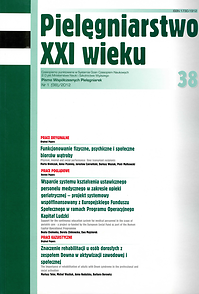The expectations of nurses in connection with the process of their education
Keywords:
expectations, education, nursesAbstract
THE EXPECTATIONS OF NURSES IN CONNECTION WITH THE PROCESS OF THEIR EDUCATION
Introduction. Due to the constant development of medicine, modern nursing requires constant training.
Aim. The aim of the study was an attempt to examine the expectations of nurses in connection with the process of their further education.
Material and methods. The subjects of the research were 405 students of nursing at 3 universities in Poland. The study used two questionnaires.
Results. 30% of graduate students and 36% of transfer students admitted that they had undertaken studies in order to gain knowledge, experience, and to broaden their horizons. Another important reason was to obtain Master’s degree (30% of graduate students).
Only 5% of the respondents did not broaden their knowledge outside the studies. The subject expected to obtain wages (31%) and to improve their qualification (25%) after the graduation. Over 60% of the respondents had no intension of going abroad for work after the graduation.
Conclusions. Nurses purse further education in collage in order to gain knowledge and experience. The respondents actively participate in courses, workshops and conferences. What they expect the graduation is mainly better wages and higher qualifications. Most of them do not intend to go abroad for work upon the completion of their education.
References
1. Ustawa z dnia 5 lipca 1996 r. o zawodach pielęgniarki i położnej, Dz.U.01.57.602
z póź. zm.
2. Kamińska M. Motywy kształcenia pielęgniarek i położnych na poziomie akademickim. Pielęgniarstwo Polskie. 2002;1(13):50-59.
3. Lesińska-Sawicka M, Kapała W. Studia pomostowe dla pielęgniarek w ocenie ich absolwentów. Nowoczesne Pielęgniarstwo i Położnictwo. 2007;1(1). Portal Pielęgniarek i Położnych- http://www.pielęgniarki.info.pl.
4. Kolonko J, Grzywna T, Sternal D i wsp. Licencjackie studia pomostowe dla pielęgniarek w opinii studentów WNOZ ATH w Bielsku-Białej. Problemy Pielęgniarstwa. 2008;16(1,2):88-93.
5. Bidzińska E, Sobczak M, Rakowska K. Motywy podwyższania kształcenia przez pielęgniarki Wojewódzkiego Szpitala Zespolonego w Elblągu. Problemy Pielęgniarstwa 2007;15(2,3):197-202.
6. Studia z UE dla 18 tyś. pielęgniarek, Dziennik Gazeta Prawna, http://praca.gazetaprawna.pl/wywiady/457448,studia_z_ue_dla_18_tys_pielegniarek.html, publikacja 11.10.2010 r.
7. Leńczuk-Gruba A, Kobos E, Wójcik G. Motywy uczestnictwa pielęgniarek w kształceniu podyplomowym organizowanym przez Warszawski Uniwersytet Medyczny. Medycyna, Dydaktyka, Wychowanie. 2009;16(4):25.
8. Naczelna Izba Pielęgniarek i Położnych, http://www.izbapiel.org.pl/index.php?id=228, dane na dzień 31.12.2010 r.
9. Wójcik G, Sienkiewicz Z, Wrońska I. Migracja zawodowa personelu pielęgniarskiego jako nowe wyzwanie dla systemu ochrony zdrowia. Problemy Pielęgniarstwa. 2007;15(2,3):120-127.
10. Ławska W, Dębska G, Zięba M i wsp. Przygotowanie zawodowe i plany absolwentów kierunku pielęgniarstwo w Podhalańskiej Państwowej Wyższej Szkole Zawodowej w Nowym Targu. Problemy Pielęgniarstwa. 2010;18(2):163-168.
Downloads
Published
Issue
Section
License
Copyright (c) 2012 Katarzyna Pawłowska, Anna Doboszyńska (Autor)

This work is licensed under a Creative Commons Attribution 4.0 International License.




